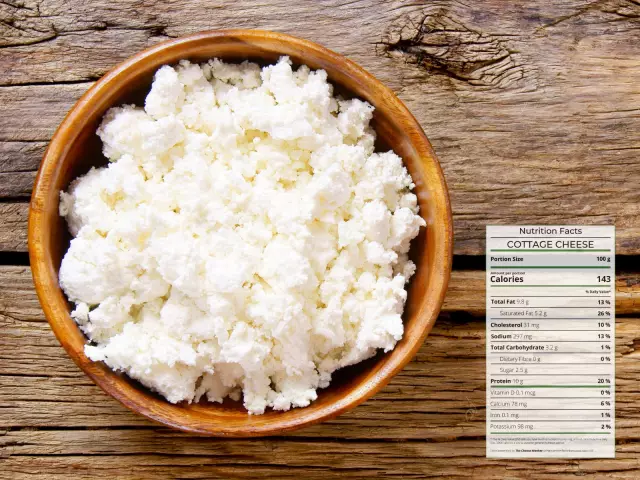- Author Rachel Wainwright wainwright@abchealthonline.com.
- Public 2023-12-15 07:39.
- Last modified 2025-11-02 20:14.
Poisoning with cottage cheese
Cottage cheese is a popular and healthy fermented milk food product that is used, among other things, for baby and diet food. Curd is obtained by heating pasteurized milk, followed by the addition of pepsin and sourdough, and removing liquid whey after the curd is completed. The fat content of the finished product can vary from 0% to 23%. Cottage cheese with a high percentage of fat deteriorates faster, as it oxidizes more intensively.

Source: depositphotos.com
How does cottage cheese poisoning happen?
Poisoning with cottage cheese is possible if you eat a product that has been stored for more than 4 days or at a temperature of more than + 8 ° C.
Care should be taken when purchasing homemade cottage cheese, since an incorrect manufacturing process with non-compliance with sanitary rules can lead to a shortened shelf life. Often, in such cases, the product is initially contaminated with microorganisms if:
- milk is obtained from sick animals;
- the person who made the cottage cheese is sick with an infectious disease (respiratory or rotavirus infection, helminthiasis, viral hepatitis A, salmonellosis, dysentery);
- cows giving milk were not handled properly;
- the container for storing and carrying the finished product was dirty, etc.
It is especially dangerous to purchase cottage cheese outside stationary retail chains in the summer - at high ambient temperatures, bacteria in products multiply and produce toxins much faster.
Poisoning symptoms
Poisoning symptoms will appear within a few hours after consumption. These include:
- weakness, drowsiness, headache, dizziness;
- nausea, vomiting, heartburn, belching;
- unstable stools, pain in the intestines;
- increased body temperature.

Source: depositphotos.com
First aid for poisoning
- Gastric lavage. To do this, drink a large amount of water (about 1 liter) and provoke an emetic urge by pressing with your fingers or a spoon on the root of the tongue.
- Fluid replacement. This is the most important stage in first aid for food poisoning, since dehydration can occur as a result of fluid loss. It is necessary to "drink" the patient (perform oral rehydration): a tablespoon of liquid every few minutes, on average up to one and a half liters per hour. Since during vomiting and diarrhea, not only water is lost, but also useful trace elements, it is recommended to use saline solutions for rehydration, for example, Rehydron. It is necessary to drink in small sips so as not to activate the gag reflex.
- The use of sorbents ("Polysorb", "Enterosgel", "Polyphepan", "Smecta") for effective binding and removal of toxins.
Attention! It is strictly forbidden to use antiemetic drugs and diarrhea drugs, as this will slow down the elimination of toxins from the body and increase the symptoms of the disease.
The use of antibiotics for food poisoning is impractical, since the disease is caused not by bacteria, but by the toxins produced by them.
When is medical attention required?
In case of mild poisoning, you can be treated at home, without hospitalization, in case of moderate and severe poisoning, you must call a doctor or an ambulance and receive treatment in a hospital.
Qualified medical attention is needed if:
- the temperature rises or becomes insensitive to antipyretic drugs;
- impossible to rehydrate;
- persistent exhausting vomiting developed;
- general health has worsened (headache intensifies, pains in muscles and bones appear);
- convulsions, confusion appeared, coordination was disturbed.
Young children are subject to compulsory hospitalization, regardless of the severity of the process. If a child is injured, inpatient treatment is necessary, because with toxicoinfection, diarrhea and vomiting can lead to dehydration in a short period of time, which is a condition requiring urgent hospitalization.
Possible consequences
Usually, after poisoning with cottage cheese, the body is restored without any serious consequences within 2-7 days.
With an unfavorable combination of circumstances, one of the serious complications may develop:
- hypovolemic shock (a critical drop in blood pressure due to dehydration);
- infectious toxic shock;
- acute heart failure (caused by increased excretion of potassium from the body, as a result of which the contractility of the heart muscle decreases).
Prevention
There are strict storage standards for cottage cheese: no more than 4 days at a temperature of +2 to + 6 ° C, it is preferable to store it in an enamel or glass container, but not in a plastic bag. The container with cottage cheese must be closed with a lid to reduce the contact of the product with air. Vacuum packed cottage cheese can keep fresh for up to 30 days. Also, cottage cheese can be frozen for later use in cooking, however, its taste will change in this case.
The main preventive measures are control of the shelf life and storage standards of the product.
If the cottage cheese is stored for more than 4 days, it was left for several days in a plastic bag, it lay warm in an open container for several hours - you should stop using it.
YouTube video related to the article:

Olesya Smolnyakova Therapy, clinical pharmacology and pharmacotherapy About the author
Education: higher, 2004 (GOU VPO "Kursk State Medical University"), specialty "General Medicine", qualification "Doctor". 2008-2012 - Postgraduate student of the Department of Clinical Pharmacology, KSMU, Candidate of Medical Sciences (2013, specialty "Pharmacology, Clinical Pharmacology"). 2014-2015 - professional retraining, specialty "Management in education", FSBEI HPE "KSU".
The information is generalized and provided for informational purposes only. At the first sign of illness, see your doctor. Self-medication is hazardous to health!






